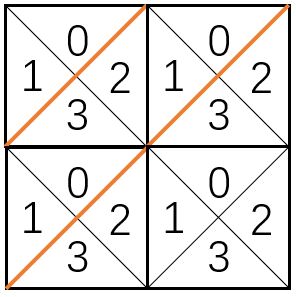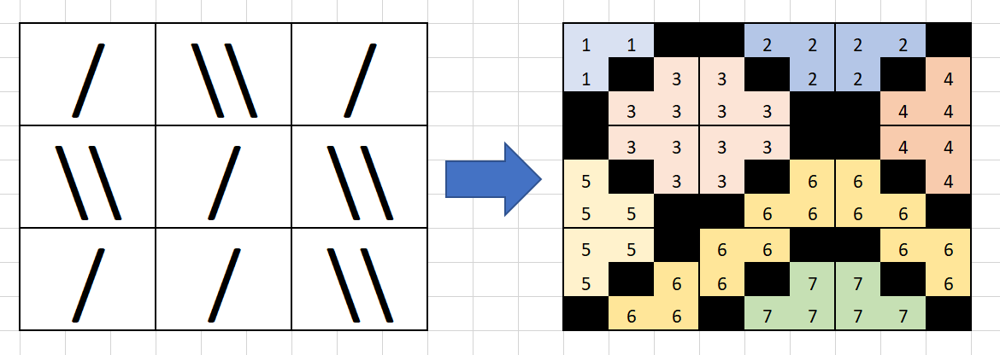Problem Statement
An n x n grid is composed of 1 x 1 squares where each 1 x 1 square consists of a ‘/’, ‘', or blank space ‘ ‘. These characters divide the square into contiguous regions. Given the grid grid represented as a string array, return the number of regions. Note that backslash characters are escaped, so a ‘' is represented as ‘\’.
Example 1:
 Input: grid = [” /”,”/ “]
Output: 2
Input: grid = [” /”,”/ “]
Output: 2
Intuition
- This problem can basically be understood as a disjoint set problem. The objective is to find how many disjoin sets there are.
- The next problem we face is, how are we going to find all the disjoin sets. There are two possible ways to do this.
- Union Find
- we should try to divide the squares into 4parts each

- basically whenever we see ‘/’, 0 and 1 can be joined and 2 and 3 can be joined
- when wee see ‘', 0 and 2 can be joined and 1 and 3 can be joined
- when it is empty, all 4 parts can be joined togther
- we also need to see if parts in the current square can be joined with parts from surrounding squares
- DFS or BFS (finding number of islands)
- in order to convert this into ‘finding number of islands’ problem, we can upscale the grid into [n * 3][n * 3] grid and then try to represent the crossing lines in the middle

- in order to convert this into ‘finding number of islands’ problem, we can upscale the grid into [n * 3][n * 3] grid and then try to represent the crossing lines in the middle
Approach
Union find approach
- iterate through each grid
- check if grid is ‘/’ -> (0,1) and (2,3) need to be joiend
- check if grid is ‘' -> (0, 2) and (1,3) need to be joined
- also we need to join parts of the cur grid with parts from the surring squares
- We don’t have to check for all 4 parts. Since we are iterating from left to right and top to bottom, we only need to join 0 with top’s 3 and 1 with left’s 2
Code
Union Find approach
vector<int> boss_list;
int cnt;
int get_boss(int sub) {
if (boss_list[sub] == sub) return sub;
return boss_list[sub] = get_boss(boss_list[sub]);
}
void join(int a, int b) {
int a_boss = get_boss(a);
int b_boss = get_boss(b);
if (a_boss == b_boss) return;
--cnt;
boss_list[a_boss] = b_boss;
}
int regionsBySlashes(vector<string>& grid) {
int n = grid.size();
cnt = n * n * 4;
for (int i = 0; i < cnt; ++i) boss_list.push_back(i);
for (int i = 0; i < n; ++i) {
for (int j = 0; j < n; ++j) {
int index = (i * n + j) * 4;
int a = index;
int b = index + 1;
int c = index + 2;
int d = index + 3;
if (grid[i][j] == '/') {
join(a, b);
join(c, d);
}
else if (grid[i][j] == '\\') {
join(a, d);
join(b, c);
}
else {
join(a, b);
join(b, c);
join(c, d);
}
// left
if (j != 0) {
int left = (i * n + j - 1) * 4 + 2;
join(left, a);
}
// top
if (i != 0) {
int top = ((i - 1) * n + j) * 4 + 3;
join(top, b);
}
}
}
return cnt;
}
DFS approach
int dfs(vector<vector<int>> &g, int i, int j) {
if (min(i, j) < 0 || max(i, j) >= g.size() || g[i][j] != 0)
return 0;
g[i][j] = 1;
return 1 + dfs(g, i - 1, j) + dfs(g, i + 1, j) + dfs(g, i, j - 1) + dfs(g, i, j + 1);
}
int regionsBySlashes(vector<string>& grid) {
int n = grid.size(), regions = 0;
vector<vector<int>> g(n * 3, vector<int>(n * 3, 0));
for (int i = 0; i < n; ++i)
for (int j = 0; j < n; ++j)
if (grid[i][j] == '/')
g[i * 3][j * 3 + 2] = g[i * 3 + 1][j * 3 + 1] = g[i * 3 + 2][j * 3] = 1;
else if (grid[i][j] == '\\')
g[i * 3][j * 3] = g[i * 3 + 1][j * 3 + 1] = g[i * 3 + 2][j * 3 + 2] = 1;
for (int i = 0; i < n * 3; ++i)
for (int j = 0; j < n * 3; ++j)
regions += dfs(g, i, j) ? 1 : 0;
return regions;
}
Take Away
- First, always think about what kind of problem I need to solve. All the questions are worded differently but, a lot of them can be converted into easier problems.